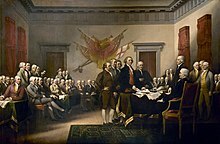As President’s Day approaches, history reminds us, that George Washington was elected to be the presiding officer at the Philadelphia Convention; later to be known as the Constitutional Convention. Washington’s contribution to the Convention is mostly unknown, undocumented, and perhaps lackluster. The contributions of the other founding fathers are well known including Thomas Jefferson and John Adams who were NOT even present at the Convention. And, of course, there is James Madison, known as the father of the Constitution. After the Revolutionary War, the paths of our first four Presidents were to cross once again to build a new and stronger government.
In his November 5th, 1786 letter to James Madison, not long after the Annapolis Convention adjourned, George Washington pleaded for a new and stronger government saying “The consequences of a lax, or inefficient government, are too obvious to be dwelt on. Thirteen Sovereignties pulling against each other and all tugging the federal head, will soon bring ruin on the whole”. Emphasis must be placed on the word “NEW”, not revised, not amended, but new. This is part of the reason that the delegates unanimously elected George Washington to preside over the Philadelphia Convention. Knowing in advance of the radical change the delegates intended to enact on our form of government required a leader with strength and credibility; a commanding presence.
George Washington was not a politician. He was not an attorney, a barrister, or trained in the law. However, he was trained in managing men and his task was to manage the very passionate federalist and anti-federalist delegates at the convention. George Washington was elected to preside over the Constitutional Convention in anticipation of uniting the new nation behind the idea of a new federal government.
Two of the founding fathers who had the most impact on the creation of the Constitution of the United States were not even present during the Philadelphia Convention. John Adams and Thomas Jefferson were in England and France respectively acting as ambassadors of our new nation. When they heard the political leaders were about to embark on a new form of government, John Adams immediately wrote Volume 2 of his 'A Defense of the Constitutions of the Governments of the United States of America' which included an account of the various forms of governments throughout world history describing their success and failures. Thomas Jefferson sent a sea chest full of books to James Madison covering the same subjects that John Adams wrote. This historical knowledge was sent to prepare and guide the delegates of the Constitutional Convention in their development of a new form of sustainable government.
It is important to note that the partnership between Washington and Madison was the key that unlocked the door to the convention. As Madison wrote to Washington on April 16, 1787, having "formed in my mind some outlines of a new system, I take the liberty of submitting them without apology, to your eye." The outline for a new government that Madison entrusted to Washington originated in a paper he had just completed, "Vices of the Political System of the US [sic]." When the Virginia delegates arrived in Philadelphia in early May 1787 with Washington at their head, they immediately sat down and prepared a document based on Madison's outline that became known as the "Virginia Plan of Government." Madison's plan, which favored the large states and gave enormous power to a new federal government, became the nationalists' opening line of debate. It was the first order of business, right out of the gate, at the Philadelphia Convention.
Even though this is on or near President’s Day you may wonder what does this have to do with the Convention of States? What is the point being made here?
The point is that even though there have been 42 Convention of States that have set precedence on how a convention will proceed yet the opposition foolishly claims that there still ‘could’ be a runaway convention.
The opposition often cites that the Philadelphia Convention, also known as the Constitutional Convention, ran away from its original purpose which was to amend the Articles of Confederation. However, the historical record does not support this revisionist history. Amending the Articles of Confederation was never the purpose. Using the Presidents’ contributions to our Constitution reveals to everyone that the Philadelphia Convention was called for the sole purpose of creating a new form of government; NOT for amending the Articles of Confederation.
Ironically, the opposition to a Convention of the States will disparage the origins of our Constitution while at the same time claiming that they are protecting this document from being weakened. The runaway convention argument is filled with contradictions and disconnects so it is very difficult to consider it with any seriousness. The opposition to a Convention of the States is baseless because the runaway convention argument does not stand on its own merits; it undermines itself.
John Poelstra is the most unrecognized and least published blog writer for COS, but fourth in the State of Michigan for active COS Activists Points.






